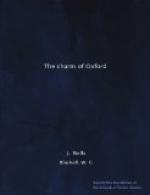But it has been on the humanistic, rather than on the scientific, side that Corpus men have specially distinguished themselves. The first century of the College existence produced the two great Elizabethan champions of Anglicanism. Bishop Jewel, whose “Apology” was for a long period the great bulwark of the English Church against Jesuit attacks, had laid the foundations of his great learning in the Corpus Library, still—after that of Merton—the most picturesque in Oxford; he often spent whole days there, beginning an hour before Early Mass, i.e. at 4 a.m., and continuing his reading till 10 p.m. “There were giants on the earth in those days.” Even more famous is the “judicious Hooker,” who resided in the college for sixteen years, and only left it when, by the wiles of a woman, he, “like a true Nathanael who feared no guile” (as his biographer, Isaac Walton, writes), was entrapped into a marriage which “brought him neither beauty nor fortune.” The first editor of his great work, The Ecclesiastical Polity, was a Corpus man, and it was only fitting that the Anglican Revival of the nineteenth century should receive its first impulse from the famous Assize Sermon (in 1833) of another Corpus scholar, John Keble.
Corpus has been singularly fortunate in its history, no doubt because its Presidents have been so frequently men of mark for learning and for character. Even in the dark period of the eighteenth century it recovered sooner than the rest of the University, and one of its sons records complacently that “scarcely a day passed without my having added to my stock of knowledge some new fact or idea.” A charming picture of the life of the scholars of Corpus at the beginning of the last century is given in Stanley’s Life of Arnold; for the famous reformer of the English public-school system was at the College immediately after John Keble, whom he followed as fellow to Oriel, on the other side of the road. It need hardly be added that in those days an Oriel Fellowship was the crown of intellectual distinction in Oxford.
Bishop Foxe had set up his college as a “ladder” by which, “with one side of it virtue and the other knowledge,” men might, while they “are strangers and pilgrims in this unhappy and dying world,” “mount more easily to heaven.” Changing his metaphor he goes on, “We have founded and raised up in the University of Oxford a hive wherein scholars, like intelligent bees, may, night and day, build up wax to the glory of God, and gather honeyed sweets for their own profit and that of all Christian men.” So far as it is given to human institutions to succeed, his college has fulfilled his aims.
CHRIST CHURCH (1) THE CATHEDRAL
[Plate XVII. Christ Church : The Cathedral from the Meadows]
“Those voiceless towers
so tranquil seem,
And yet so solemn in
their might,
A loving heart could
almost deem
That they themselves
might conscious be
That they were filled
with immortality.”
F.
W. FABER.




